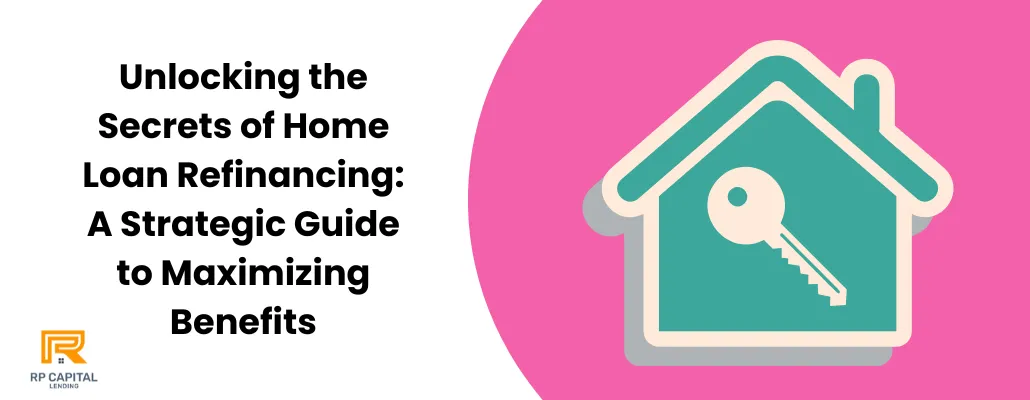Blog

Unlocking the Secrets of Home Loan Refinancing: A Strategic Guide to Maximizing Benefits
Have you ever wondered if you could be saving more on your mortgage? Refinancing your home loan might be the silver bullet you need to reduce your monthly payments, pay off your mortgage faster, or even tap into your home's equity for large expenses.
But when is the right time, and how should you go about it to ensure maximum benefits? This guide dives deep into the intricacies of home loan refinancing, helping you navigate the process with ease and confidence.
Understanding Home Loan Refinancing
Refinancing your home loan involves replacing your existing mortgage with a new one, usually with better terms. The reasons for refinancing are as varied as the benefits it can offer:
Lower Interest Rates: Securing a lower interest rate can significantly reduce your monthly payments and the total interest paid over the life of the loan.
Shorter Loan Term: Refinancing can allow you to switch from a 30-year to a 15-year mortgage, for instance, helping you build equity faster and save on interest.
Debt Consolidation: Combining high-interest debts into your mortgage can lower your overall monthly payments.
Accessing Equity: Cash-out refinancing lets you borrow against the equity you've built up in your home, useful for large expenses like home renovations.
When to Refinance Your Home Loan
Significant Drop in Interest Rates: If mortgage rates have dropped since you took out your loan, refinancing might save you a lot of money.
Improved Credit Score: A higher credit score can qualify you for lower rates than you had at the start of your original mortgage.
Change in Financial Situation: If your financial stability has improved, refinancing can help adjust your payments to match your new status.
Approaching the End of an ARM Period: If you have an Adjustable Rate Mortgage (ARM), you might want to refinance to a fixed-rate mortgage before the rates rise.
How to Refinance Your Home Loan
Assess Your Current Financial Situation: Review your current mortgage terms, credit score, monthly income, and debts.
Shop Around for the Best Rates: Don’t just accept the first offer. Compare rates from multiple lenders to find the best deal.
Calculate the Costs: Refinancing isn't free. Consider fees like application fees, appraisal fees, and closing costs.
Choose the Right Mortgage: Decide whether a fixed-rate or an adjustable-rate mortgage suits your needs best.
Apply: Gather all necessary documents and submit your application to the chosen lender.
Lock Your Rate: Once you find a favorable rate, lock it in to prevent changes before closing.
Maximizing the Benefits of Refinancing
Break-Even Point: Understand when you will break even with the costs of refinancing. If you plan to move before then, it might not be worth it.
Consider the Loan Term: Extending your loan term can reduce monthly payments but might increase the total interest paid. Weigh these options carefully.
Tax Implications: Consult a tax advisor to understand how refinancing affects your taxes, especially if you’re taking out cash.
Frequently Asked Questions (FAQs)
1. What is the best reason to refinance a home loan?
The best reason varies by individual but generally includes lowering your interest rate, reducing monthly payments, or changing the loan term.
2. How often can you refinance your home loan?
Technically, you can refinance as often as you can get approved, but it’s wise to do it only when it makes financial sense, considering the costs involved.
3. Does refinancing hurt your credit score?
Refinancing can lower your credit score temporarily due to the hard inquiry from your lender. However, the impact is usually minor if you manage your finances well.
4. Can I refinance with the same lender?
Yes, many lenders would be happy to refinance your loan, but it's still a good idea to shop around for the best deal.
5. What documents do I need to refinance my mortgage?
You’ll generally need recent pay stubs, tax returns for the last two years, bank statements, and a statement of debts and assets.
Conclusion: Making the Wise Choice
Refinancing your home loan can be a powerful tool in managing your finances more effectively, but it requires careful consideration and strategic planning. By understanding when to refinance, how to navigate the process, and what benefits you can expect, you can make decisions that align with your long-term financial goals. Dive into the opportunities that refinancing offers, and take control of your financial future today.
Disclaimer: Loans only apply to non-owner occupied properties. Rates, terms and conditions offered only to qualified borrowers, may vary upon loan product, deal structure, other applicable considerations, and are subject to change at any time without notice.
Copyright © 2025. All Rights Reserved.


